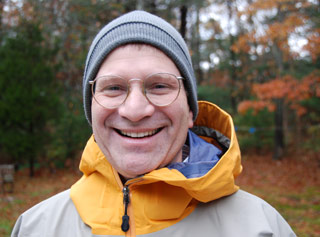Meet Mark Kurz
In the above video, Dr. Mark Kurz from Woods Hole Oceanographic Institution discusses how he can find out the ages of rocks in Antarctica to discover when ice sheets and glaciers advanced and retreated on the icy continent. That knowledge, in turn, helps scientists learn more about how and why Earth's climate changed in the past, providing clues to determine how humans are affecting Earth's climate today, and the impacts climate change will have on humans in the future.
Mark Kurz
Senior Scientist, Marine Chemistry & Geochemistry Department
Woods Hole Oceanographic InstitutionMark Kurz is the lead scientist at the Mount Morning field camp.
Role in the expedition?
I am the Principal Investigator, along with co-PI Adam Soule. My scientific role is to collect samples that can be returned to the laboratory for measurement of cosmogenic 3He. Cosmic rays produce 3He, and some other rare nuclides, when they hit the major constituents of surface rocks, hence the term “cosmogenic”. We can use the total amount of cosmogenic 3He to determine the age of rock surfaces. This technique, called surface exposure dating, will be used to determine how fast the action of freezing and thawing changes the landscape.
Why I do what I do?
I always liked working with instrumentation in the laboratory but also really enjoyed getting outside, doing field work, and seeing the planet. I became a geochemist because it seemed like an ideal way to combine these interests. When I was thinking of going to graduate school, my first advisor, MIT Professor John Edmond, told me: “join oceanography and see the world”. I took his advice, and have always appreciated the diversity, and the guaranteed excitement of learning new things. I have managed to work in some really great places: Hawaii, Iceland, Galapagos, and Antarctica. My interest in Antarctica began in the 1980’s when it became possible to date surface rocks, using measurements of rare isotopes produced by cosmic rays.
Where did I grow up? What schools did I go to?
I grew up in Waukesha, Wisconsin, which is far from the oceans. I was fortunate to have a really supportive family. My parents, Max and Kay, still live in Waukesha; they always encouraged me to read, learn, and to appreciate nature. Whatever small success I have had I owe to them. I didn’t get much formal education in earth or ocean science until I became an undergraduate at the University of Wisconsin, Madison, which opened many new horizons.
What were my favorite and least favorite things about school?
Like any kid, I hated sitting still for long time periods, particularly when the weather was nice outside. I always enjoyed the hands-on activities, like recess, and when I got to high school, I found the laboratories to be really fun. After that, I always enjoyed the company of really smart people that you find in the University academic setting, particularly the new ideas, stimulating discussions, and interesting arguments.



